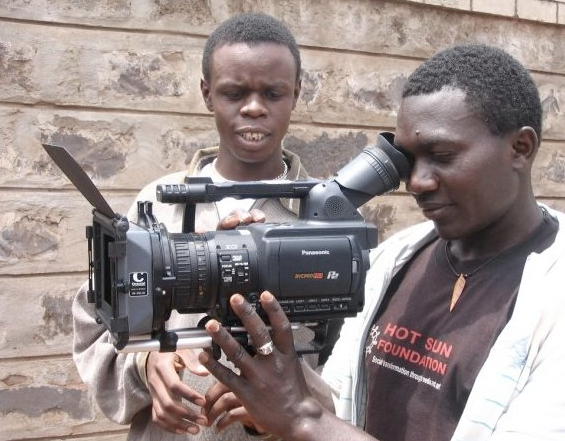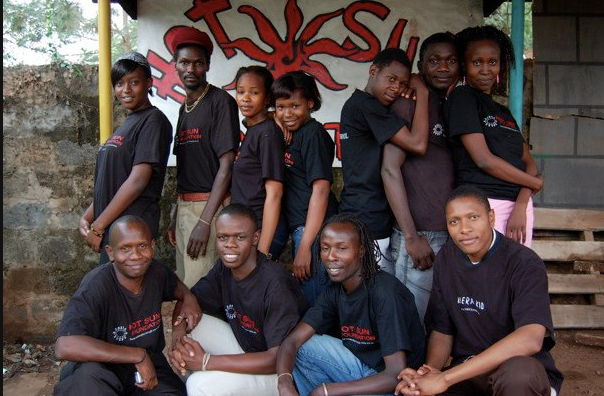A Wider Lens
 With the current condition of the world economy, the decision to quit a job to stand up for a belief is extremely difficult – particularly when there are no promising prospects of future steady work and income. This decision was particularly difficult for Vituko, a 23-year-old from Kibera, who worked for a local non-profit organization. Despite Kenya’s daunting 40 percent unemployment rate, Vituko took a stand for what he believed in and made the decision to quit his job.
Vituko was working as a teacher at Hot Sun Foundations, a local NGO commissioned by various governments and organizations that teaches the youth of Kibera skills needed in the many processes of filmmaking through a training program.
With the current condition of the world economy, the decision to quit a job to stand up for a belief is extremely difficult – particularly when there are no promising prospects of future steady work and income. This decision was particularly difficult for Vituko, a 23-year-old from Kibera, who worked for a local non-profit organization. Despite Kenya’s daunting 40 percent unemployment rate, Vituko took a stand for what he believed in and made the decision to quit his job.
Vituko was working as a teacher at Hot Sun Foundations, a local NGO commissioned by various governments and organizations that teaches the youth of Kibera skills needed in the many processes of filmmaking through a training program.
Vituko was in Hot Sun’s 2009 graduating class but stayed with the organization to work on assorted projects. In 2011, he was promoted to staff teacher for film editing.
“I really felt like I was doing something with my life,” said Vituko. “You know, I was doing really well. But I had to leave, it was not worth it anymore.”
According to Vituko and other alumni, the management at Hot Sun does not look out for the community’s interest. Throughout his time at Hot Sun, Vituko says he overlooked a lot of things that seemed questionable to him, but he did not want to jeopardize this opportunity to do what he loves – making films.
“There were donations from an American donor who we had just finished shooting a film with of a big screen TV and two new apple computers, but did we ever see any of those things? No, Nathan took the new TV and computers and took them home, and a few days later, he brought in his old TV and his old computers for us to use.”
Nathan Collette, the founder of Hot Sun, when asked about the missing equipment, gave the organization’s financial difficulties as an explanation. In regards to Vituko’s claim, Collete did say that he personally bought the donated television from the organization at full price and sold his old television back to them. In doing this, Collette believed that this provided a television to the organization with a profit from Nathan’s personal purchase of the television from Hot Sun.
“Students and volunteers don’t need to know the financial side,” said Collete. “They don’t need to worry about donors and if a donor is thinking about to pull the plug on a project or how much money we owe. We just want them to focus and to make sure the projects keep running.”
“They come here and they help us a little, but really they are bettering themselves, and using us to do it,” said another alum from the 2009 class, who requested anonymity out of concern for job security. “They expect you to keep working with them on projects for free, because you know, they think you don’t have anything else to do.”
 Vituko quit Hot Sun after a heated battle with the management when he was accused of stealing equipment. After police involvement, the missing equipment eventually was found in the home of another student. The student returned the equipment but was not reprimanded.
Vituko quit Hot Sun after a heated battle with the management when he was accused of stealing equipment. After police involvement, the missing equipment eventually was found in the home of another student. The student returned the equipment but was not reprimanded.
“I am extremely grateful I worked with Hot Sun," said Vituko. "If it wasn’t for them I would never have gotten a chance to use equipment like computers and cameras, and I would not know how to make films, but there has got to be a point when you wake up.”
Vituko, however, finds that the problem within most NGOs is a lack of understanding, despite their good intentions.
“They come here and they want to do something, to help, but they did not think about us. They do not think to ask us what we need or want. NGOs need to understand the amount of power the can yield, and not use it take advantage of us.”
Collette takes a different perspective in the problems of running a non-profit organization.
"The biggest problem when talking about these organizations is one, either everybody loves you or two, everybody thinks you are stealing from them.”
Collette also commented on the interpersonal and social issues and problems that he has had with students and trainers within Kibera.
 “We were not prepared for dealing with these kinds of problems, you know, I’m not a therapist. I didn’t start this organization with the intention of radically changing Kibera, all I wanted to do was to give the people from Kibera a chance to tell their story through film.”
“We were not prepared for dealing with these kinds of problems, you know, I’m not a therapist. I didn’t start this organization with the intention of radically changing Kibera, all I wanted to do was to give the people from Kibera a chance to tell their story through film.”
Since he quit, Vituko is working on starting his own organization that helps train children in Kibera about art and film.
“So many of us are jaded about NGOs now. So now I’m creating my own job and organization, that really has its heart here.”
Vituko's priorities for his new organization are transparent financing and community involvement in the organization's structure. "If you do that then you will lose the people of the community, and then you will lose the organization.”
